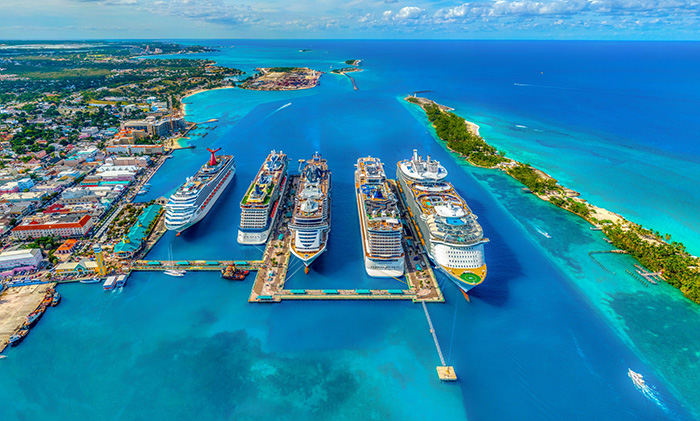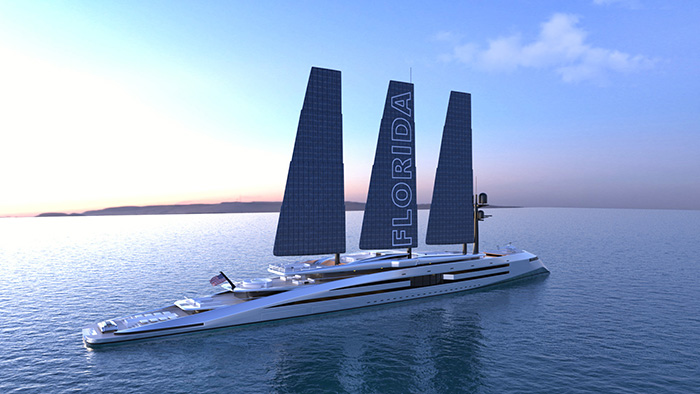ISABEL RUBIO ARROYO | Tungsteno
Carnival Corporation, the world's largest luxury cruise operator, emitted almost 10 times more sulphur dioxide around European shores in a single year than did all its 260 million cars, according to a report by Transport & Environment. In recent months, we have reviewed some clean alternatives in both the automotive industry and the aviation sector. But what about cruise ships? What kind of technologies can be used to minimise their pollution?
"While cruise ships represent only a small proportion of the global shipping fleet, they have a disproportionate impact on air quality, habitats and climate," says Transport & Environment. Spain, Italy, Greece, France and Norway are the countries most exposed to air pollution from cruise ships in Europe, according to the organisation.
Typically these ships "travel fast and close to the coastline, meaning that huge volumes of fuel are burned in close proximity to coastal populations." In addition, many dock in ports located in the heart of cities, such as Barcelona or Palma de Mallorca, thus affecting air quality. Cruise ships are also in the crosshairs of environmentalists for other reasons. The international network of environmental organisations Friends of the Earth claims that some cruise ships dump large quantities of sewage and other waste into the oceans, "polluting our beaches, contaminating our coral reefs and destroying our valuable marine ecology."
Sailing with less polluting fuels
The shipping industry is looking for ways to create ships that do not emit greenhouse gases or particulate pollutants. Currently, most cruise ships burn heavy fuel oil (HFO), "the dirtiest fossil fuel available," says Transport & Environment. In addition, these ships "do not have any diesel particulate filters or selective catalytic converters to clean the exhaust—technologies that are standard for road vehicles like trucks."
Ecologists in Action stress that cruise ships use fuels with a high sulphur content that emit pollutants that are "highly dangerous to human health." Other gases such as nitrogen dioxide, also produced during the ships' combustion processes, can have an effect on asthma, bronchial symptoms, alveolitis and respiratory insufficiency, according to the World Health Organisation.

Some cruise ships burn large volumes of fuel near coastal populations. Credit: Unsplash.
As a result, cleaner fuels have become one of the industry's main challenges in the short term. Stephen Gordon, managing director at Clarkson Research Services (a unit of shipbroker Clarkson PLC), tells The Wall Street Journal that 27% of merchant vessels under construction by tonnage will use alternative fuels. Liquefied natural gas (LNG), in addition to being used for heavy-duty road transport vehicles, is also gaining traction in the shipping industry as a more sustainable, economical and efficient alternative, advocates say. A study published in the Journal of Marine Science and Technology indicates that LNG reduces operating costs because it is cheaper than traditional fuels.
"Today LNG propulsion is the only reliable and proven alternative to significantly improve air quality and contribute to the energy transition of the shipping industry," a spokesman for the huge French shipping company CMA CGM told The Wall Street Journal. But while it is true that ships using this fuel emit far less carbon dioxide, it is not a completely clean alternative. The methane that is unburned in the combustion of this gas also results in emissions into the atmosphere and therefore also contributes to the greenhouse effect.
Hydrogen and retractable solar sails to navigate the seas
The solution, according to this report, would be to find solutions that make it possible to sail without emitting any emissions. China launched the first 100% electric cargo ship in 2017. There are also other ships such as the Mayflower—an autonomous vessel with a hybrid electric motor powered by solar energy—or the Energy Observer powered solely by clean energy. This latter catamaran has become a kind of floating laboratory that sails thanks to a combination of renewable energies and a system for producing hydrogen from seawater. At 30.5 metres long and 12.8 metres wide, the vessel has two electric motors powered by either a 112 kWh set of lithium batteries or a 1,000 kWh hydrogen fuel cell and 63kg of hydrogen. There are three photovoltaic panels and several wind turbines that are used to obtain energy and charge the batteries.
The proliferation of projects to construct boats powered by clean energy offers a glimpse of what the yachts and cruise ships of the future will be like. Among the technologies to achieve this, solar sails stand out. The company Visioncruise has been working for years on a more sustainable cruise ship: the Ecoship. This vessel has 10 retractable photovoltaic sails and 10 wind generators. The aim is to reduce carbon dioxide emissions by 30% to 40% compared to a conventional propulsion system.

Some ships have sails covered with solar panels that move to capture the Sun's rays. Credit: Kurt Strand.
Another remarkable project is the Florida, an ecological superyacht designed by the Norwegian Kurt Strand. Three 80-metre-tall mast-wings crown this 160-metre vessel. Its sails are covered with solar panels that automatically move to capture the Sun's rays. In this way, when there is no wind, the boat can activate a solar sailing mode. The masts are fitted with a washing system to keep the solar panels clean and working properly.
Although eliminating pollutant emissions from ships has become a priority for many players in the shipping industry, there is no miracle solution in the short term. The technologies that can make this possible are still under development and have only been implemented in specific projects. On a planet where more than 90% of world trade is conducted by sea and some 30 million people travel on cruise ships every year, the race to move away from dependence on polluting fossil fuels has already begun.
· — —
Tungsteno is a journalism laboratory to scan the essence of innovation. Devised by Materia Publicaciones Científicas for Sacyr’s blog.
